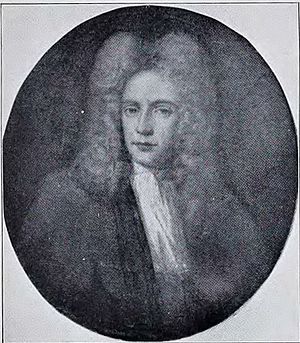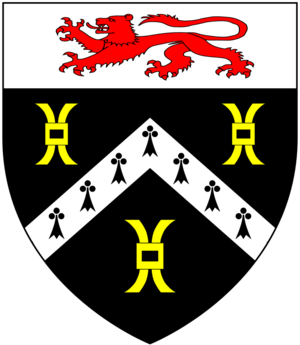Sir John Turner, 3rd Baronet facts for kids
Quick facts for kids
John Turner
|
|
|---|---|
 |
|
| 3rd Baronet | |
| In office 1739–1780 |
|
| Preceded by | Sir John Turner, 2nd Baronet |
| Succeeded by | baronetcy extinct |
| Member of the British Parliament for King's Lynn |
|
| In office 1739–1774 |
|
| Personal details | |
| Died | 25 June 1780 |
| Children | 2 |
| Alma mater | Christ's College, Cambridge |
| Occupation | lawyer |
Sir John Turner (1712–1780) was an important British lawyer and politician. He held a special title called a Baronet. He also served in the House of Commons, which is a bit like a parliament or a big meeting place where laws are made. He was a Member of Parliament (MP) for many years, from 1739 to 1774.
Contents
Who Was Sir John Turner?
His Early Life and Education
John Turner was born in 1712. His father was also named Sir John Turner, and his family lived in a place called Warham in Norfolk, England. He went to Greenwich school when he was younger.
Later, he studied law at two famous places: Middle Temple and Christ's College, Cambridge. In 1736, he finished his law studies and became a lawyer. This is called being "called to the bar." When his father passed away in 1739, John inherited the title of Baronet.
Becoming a Member of Parliament
In 1739, John Turner became a Member of Parliament for the area of King's Lynn. He took over this role from his uncle, Sir Charles Turner.
As an MP, he usually supported the government's decisions. He was elected without anyone running against him in 1741. In 1747, he won his election even though someone else tried to win the seat.
Family Life
John Turner got married for the first time in 1746 to Miss Stonehouse. Sadly, she passed away just three years later in 1749. He then married again to Frances Neale. Sir John Turner had two daughters.
His Time in Politics
Continuing His Political Career
John Turner was re-elected for King's Lynn without any opposition in 1754 and again in 1761. In 1757, he voted on an important issue about Minorca, which was a small island.
In 1761, he gave his first recorded speech in Parliament. He supported a bill to make the militia (a type of local army) a permanent group.
Working for the Government
In May 1762, John Turner was given an important job as a Lord of the Treasury. This meant he helped manage the country's money. He kept this job even when a new leader, Grenville, took over.
He supported the government during some big debates, like those involving a politician named Wilkes. However, he didn't seem to speak much during these discussions.
Leaving Government and Later Years
In 1765, when a new group called the Rockingham Administration took power, John Turner lost his job at the Treasury. For a while, he continued to support Grenville. He voted against the repeal of the Stamp Act, which was a law that taxed American colonies.
By 1768, he faced a tough election in King's Lynn. He almost lost because some people didn't like his views. He seemed to lose interest in politics after this. His last known vote in Parliament was in 1769.
His influence in King's Lynn became weaker. Because of this, he decided not to run for election again in 1774.
End of Life
Sir John Turner passed away on June 25, 1780. He was buried in Warham, the same place his family was from. Since he only had daughters and no sons, his Baronet title ended when he died.


